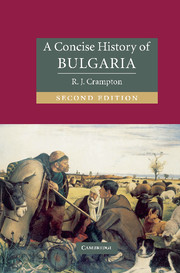Book contents
- Frontmatter
- Contents
- List of illustrations
- Preface
- Preface to the second edition
- Note on transliteration
- The Bulgarian lands: main rivers and mountains
- 1 THE BULGARIAN LANDS FROM PREHISTORY TO THE ARRIVAL OF THE BULGARIANS
- 2 MEDIAEVAL BULGARIA, 681–1393
- 3 OTTOMAN RULE IN THE BULGARIAN LANDS
- 4 THE NATIONAL REVIVAL AND THE LIBERATION
- 5 THE CONSOLIDATION OF THE BULGARIAN STATE, 1878–1896
- 6 FERDINAND'S PERSONAL RULE, 1896–1918
- 7 BULGARIA, 1918–1944
- 8 BULGARIA UNDER COMMUNIST RULE, 1944–1989
- 9 POST-COMMUNIST BULGARIA
- CONCLUSION
- Appendix 1 Bulgarian monarchs
- Appendix 2 Prime ministers of Bulgaria, 1879–2004
- Suggestions for further reading
- Index
- CAMBRIDGE CONCISE HISTORIES
5 - THE CONSOLIDATION OF THE BULGARIAN STATE, 1878–1896
Published online by Cambridge University Press: 05 June 2012
- Frontmatter
- Contents
- List of illustrations
- Preface
- Preface to the second edition
- Note on transliteration
- The Bulgarian lands: main rivers and mountains
- 1 THE BULGARIAN LANDS FROM PREHISTORY TO THE ARRIVAL OF THE BULGARIANS
- 2 MEDIAEVAL BULGARIA, 681–1393
- 3 OTTOMAN RULE IN THE BULGARIAN LANDS
- 4 THE NATIONAL REVIVAL AND THE LIBERATION
- 5 THE CONSOLIDATION OF THE BULGARIAN STATE, 1878–1896
- 6 FERDINAND'S PERSONAL RULE, 1896–1918
- 7 BULGARIA, 1918–1944
- 8 BULGARIA UNDER COMMUNIST RULE, 1944–1989
- 9 POST-COMMUNIST BULGARIA
- CONCLUSION
- Appendix 1 Bulgarian monarchs
- Appendix 2 Prime ministers of Bulgaria, 1879–2004
- Suggestions for further reading
- Index
- CAMBRIDGE CONCISE HISTORIES
Summary
THE CONSTITUENT ASSEMBLY AND THE TÛRNOVO CONSTITUTION
The assembly which was to devise Bulgaria's political system met in Tûrnovo in late February 1879. It contained a mixture of elected and nominated deputies, the latter including representatives of the Turkish, Greek and Jewish minorities.
The assembly also contained deputies from Bulgarian lands outside the new principality. This indicated that the great passion over borders had not subsided. Indeed, there had been attempts to rekindle the struggle in Macedonia. Activists in Bulgaria staged a rising in the Kresna-Razlog region of eastern Macedonia, but it was not well coordinated and was suppressed with ease. The territorial question, however, was still the first preoccupation of the delegates when they assembled in the mediaeval capital, and a vocal faction amongst them urged that they disperse and the assembly be disbanded; better, they argued, unity under Ottoman authority than a division of the nation between the free and the enslaved. Others supported this argument with suggestions that Bulgaria should seek a compromise similar to that granted to the Hungarians in 1867. A more moderate view urged that the Tûrnovo assembly be postponed rather than dissolved, and that the breathing space be used to draw up a petition which a delegation should then take around the European capitals. The Russians were embarrassed by all this. They feared that any postponement of the assembly might lead to international complications which, in their enfeebled post-war condition, they could not afford.
- Type
- Chapter
- Information
- A Concise History of Bulgaria , pp. 85 - 116Publisher: Cambridge University PressPrint publication year: 2005



